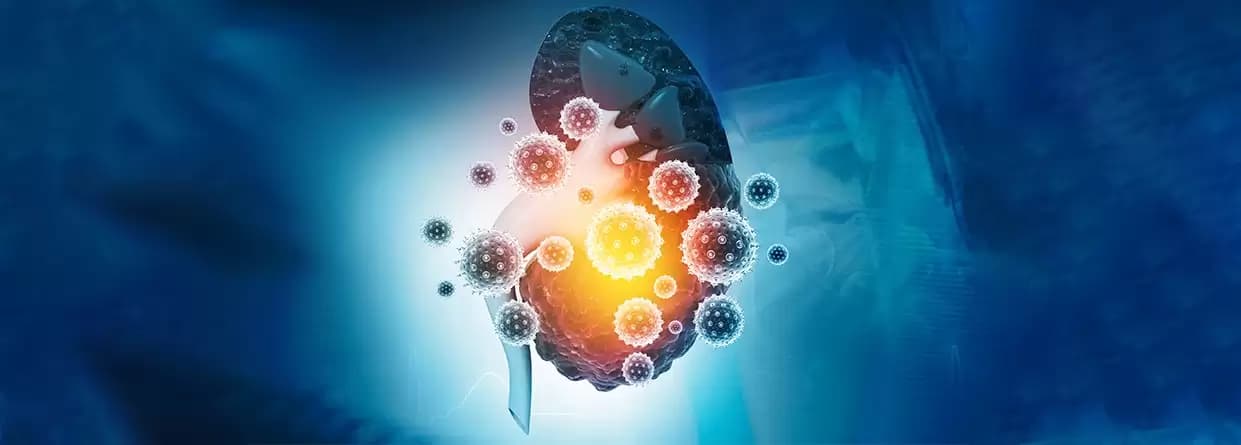
Polycystic kidney disease is a genetic disorder causing cysts that are fluid-filled to form in the kidneys. It leads to kidney function impairing and potentially kidney failure. An individual having this condition generally experiences issues like abdominal pain, urine blood, back pain, urge to urinate often etc.
Do you often notice blood in the urine but ignore it? Did you know it can be a sign of polycystic kidney disease? Yes, you heard it right. Generally, people overlook such signs and later regret them. Kidney diseases are one of the serious illnesses which require a doctor's immediate consultation. If you aren’t unaware of polycystic kidney disease and don’t know the causes or symptoms behind it, then, in this blog, you will find a comprehensive discussion on this aspect. Make sure to read it till the end. Kindly note it is for informative purposes only and doesn’t rule out the consultation of a doctor.
Polycystic kidney disease is a genetic disorder causing cysts that are fluid-filled to form in the kidneys. It leads to kidney function impairment and potential kidney failure. An individual having this condition generally experiences issues like abdominal pain, urine blood, back pain, the urge to urinate often, etc. It is among the fourth primary causes of kidney failure. People having this condition also experience developed cysts in the liver along with other complications.
Most people with polycystic kidney disease live for years without observing any symptoms of the illness. Here are some of the polycystic kidney disease symptoms:
Children who have autosomal recessive polycystic kidney disease experience symptoms like:
Symptoms in children might seem like any other illness. It is vital to consult a healthcare professional for clinical attention.
Abnormal genes are one of the primary causes of polycystic kidney disease. It means that in most cases, the illness keeps moving in families. There are times when genetic mutations happen on their own. There are two types of polycystic kidney disease which becomes the causes of PKD which includes:
If timely treatment is not considered after diagnosis of polycystic kidney disease, then it can pose serious complications. Here are some of the polycystic kidney disease complications:
For polycystic kidney disease diagnosis, there are certain tests ordered by the doctor. With these tests, the doctor will not only be able to confirm the diagnosis but also can evaluate the severity and situation of kidney diseases. Here are the following tests which are generally recommended:
The primary aim of polycystic kidney disease treatment is managing the symptoms and avoiding complications. The most important part of the treatment is controlling high blood pressure. Here are some of the treatment options:
Here are some of tips for polycystic kidney disease prevention:
People with polycystic kidney disease can lead a normal life. If you are diagnosed with PKD, you don’t have to get apprehensive as with right treatment options it can be managed. It is important to know that around half of people with PKD require dialysis or a kidney transplant because of kidney failure, but it is mostly for people who are over 70. The most important part is that you shouldn’t delay the treatment. If you are looking for healthcare services, then consult Rukmani Birla Hospital, one of the finest multispecialty hospitals in Jaipur.
Yes , polycystic kidney disease is fatal as it tends to progressing rapidly.
No, polycystic kidney disease doesn’t skip a generation
Polycystic kidney disease1 (PKD1) or polycystic kidney disease 2 (PKD2) are two mutations in the genes causing PKD.
No cure is available for polycystic kidney disease, however, the symptoms can be managed with certain treatment options.
No, people with polycystic kidney disease can lead a normal life, but it doesn’t imply to people who are over 70
A limited amount of drinking is allowed for people with polycystic kidney disease, but is for patients who aren’t on dialysis
The best way to prevent polycystic kidney disease is to manage weight, eat healthily, quit smoking, manage blood pressure, and exercise regularly.
Similar Renal Sciences Blogs
Book Your Appointment TODAY
© 2024 RBH Jaipur. All Rights Reserved.